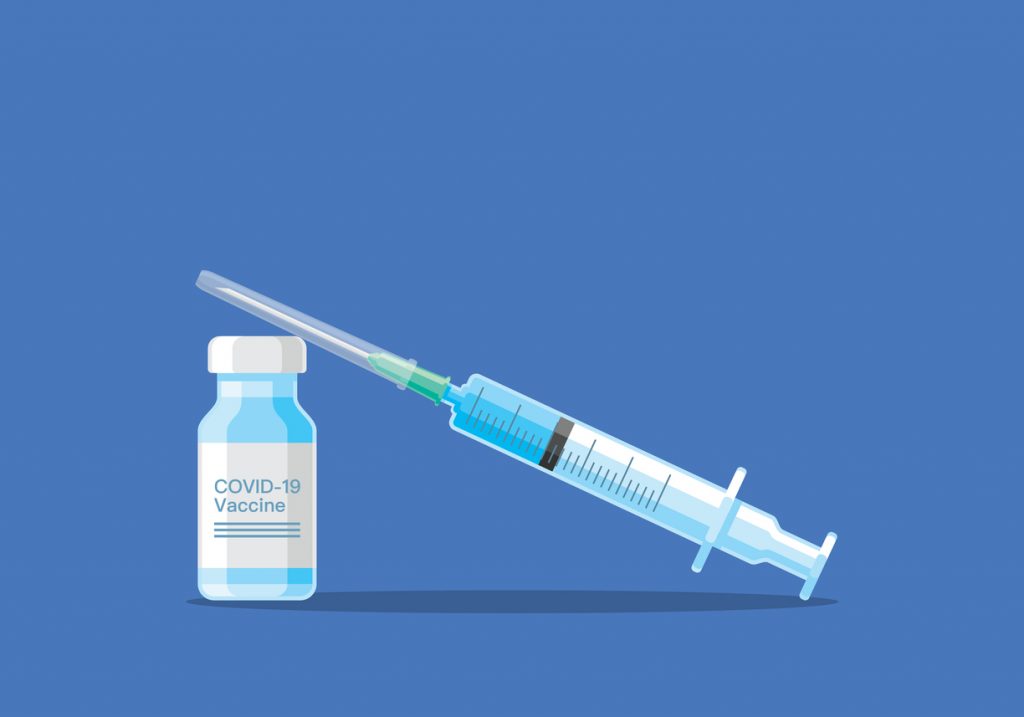Everything You Want to Know About Covid-19 Vaccine Safety

As Covid-19 vaccine supplies ramp up in Canada, more and more parents are starting to become eligible. While many are eager to get vaccinated, others have quietly told me that they aren’t so sure.
They’ve heard things from friends and family and neighbours. They’ve seen videos uploaded on social media. They see co-workers turning down the chance to get vaccinated and wonder if they should also hold off—at least for now. Often, it’s not any one concern that gives them pause so much as the accumulation of them all.
Simply put, there seems to be more questions than there are answers.
So, I went looking for some answers. I spoke at length with Dr. Supriya Sharma, the chief medical advisor to Health Canada, and asked her the same questions that SavvyMom readers have shared with me. Dr. Sharma welcomed all of my questions and spoke frankly and directly, with answers grounded in scientific data.
We covered what an interim or emergency authorization means in terms of vaccine safety, the risks of blood clots with the AstraZeneca vaccine, how mRNA vaccines work, and when we might see an authorized vaccine for children. (Spoiler alert! The takeaway is that interim authorizations don’t skimp on data, AstraZeneca clot risks are real but small, mRNA vaccines won’t affect your DNA at all, and shots for kids 12 and older could be here sooner than you think.)
Dr. Sharma says she wants to provide as much information as possible to Canadians because “We all have different ways that we take in that information. We all have different ways that we think about risks and benefits. And they’re all valid.”
Here is the interview:
SavvyMom: A lot of moms I’ve spoken with have questions and concerns about these new Covid vaccines. They are making decisions for their own health, but also for their entire families. It’s important that we get them good information, so thank you for talking with me today. To start, there are four vaccines approved for use in Canada right now, is that correct? The Pfizer, Moderna, AstraZeneca, and Johnson & Johnson vaccines?
Dr. Sharma: That’s right. The only caveat is that there’s a there’s a version of the AstraZeneca vaccine that’s called the COVISHIELD vaccine, which is the one that’s made in the serum Institute of India. It is technically a different vaccine because it’s made by a different company, but it’s based on the same data. So there’s four or five, if you count this the second version of the AstraZeneca.
How did these vaccines get approved so fast?
SM: We keep hearing these vaccines have emergency authorization versus full approval. Can you explain what that means?
Dr. Sharma: Sure, in the US the FDA has an “emergency use” authorization. In Canada, we have what’s called an “interim order authorization.” Now, the important part is that with the interim order we take the same data and use the same process that we would normally go through to authorize the vaccine.
This interim order gives us flexibility in the way that we get that data, but it doesn’t change, fundamentally, what we’re looking for. People think that if it’s an emergency use or interim order authorization, then we’re somehow looking at less data or doing something less than we would for another vaccine. And we’re not. There’s no corners cut at all on the requirements.
But the interim order does allow us some flexibility. So, for example, it allows us to do something called a rolling review. Normally, when we do a vaccine authorization, the company puts all the data together in one package: all the lab data, all of the testing, including the animal testing and all of the clinical trials data. So they wait until the trials that test on humans, as well as the manufacturing data, is all complete before they give that package to Health Canada. The rolling review allows us to say, okay, you can give us some of that data now, as long as the vaccine is at a certain level of development.
And then, as you get more data from these clinical trials, you can give those to us later. That lets us start to review it sooner. And then as more data becomes available, that goes into the review as well. So, it’s more about trying to make the review more efficient, rather than making any compromises at all in terms of the information that we need to look at.
SM: So you’re speeding up the administration process, more or less, rather than cutting corners with the data?
Dr. Sharma: Yes, absolutely. When the idea of Covid vaccines first came up, we worked internationally with all of the other regulators including the US FDA and the European Medicines Agency to say, what are the requirements for Covid-19 vaccines in terms of safety, effectiveness, and quality? And we collectively decided that we were going to not let companies skip any of the steps. We were going to make all of the requirements the same. But we have reorganized ourselves into specialized teams of about seven to ten that are working on one vaccine and that is all they do 24-7.
To give you an idea of the difference in timing, for example, we received that submission for the Pfizer vaccine on October 9 and we authorized it on December 9. That review would normally take a year if it were a usual vaccine review, but that was just done in a couple of months even though we put in the same number of hours as we normally do over a year.
SM: Okay, that’s good to know. Another thing I’m hearing is these covid vaccines being described as “experimental vaccines.” Is there any truth to that? Is the general public some sort of final experimental phase of testing?
Dr. Sharma: For me, an experiment is something where you, you set up a question, and then you set up a study to answer that question. I think when people hear the word experimental, they’re thinking about things that are early on in development, so they’re not tested yet. And for the vaccines that are authorized under the interim order, they’ve gone through all the phases. They’ve gone through the early laboratory tests, then the animal studies, then small phase one studies to look for any major side effects on the safety side. And then they do it in larger groups of people in the phase two to figure out what doses are the best, to make sure there’s no major safety issues, and to start to get information about how well they work. Finally, you have the large phase three trials.
So, by the time that these vaccines are authorized under the interim order, they been involved in clinical trials with tens of thousands of people. So, for me, that’s an authorization that’s been shown through data to have met our standards and that’s not experimental anymore. Now, we do continue to collect information because once you start getting these vaccines to millions of people and different populations. But once that interim order authorization is in place, for me, the vaccines are no longer in the category of experimental. They’ve proven that they meet standards for safety, efficacy, and quality.
SM: So tens of thousands of people have gone through these Covid vaccine trials. How does that compare with how many people a vaccine would be tested on in normal circumstances?
Dr. Sharma: In a lot of cases, it’s actually higher than what we might normally see. There’s no magic number of how many people you absolutely need in that trial. The way trials work is that you set up your question that you want to be answered by this study and then you figure out what markers you’re going to be looking for and what are you going to be measuring in that study. Then, based on that, you can calculate what the minimum number of people you need to answer that question. So, some of these trials can have up to 100,000 people, if you put all the trial phases together. And we’ve had other vaccines that have been authorized with just over 10,000, for example.
So, in the vast majority of cases, with these Covid vaccines, we’ve had even larger numbers. Part of that is because we do have Covid-19 cases in so many different countries, and it’s been so prevalent, that they’ve been able to do those studies and do them done much quickly than has normally been done in the past.
What are the AstraZeneca and Johnson & Johnson clotting risks?
SM: Okay, let’s talk about the most pressing concern I think Canadians have right now, which is the small risk of these AstraZeneca blood clots that are being reported. They seem to cause a stroke. Can you contextualize this risk?
Dr. Sharma: Yes, so what you’re referring to is vaccine-induced thrombotic thrombocytopenia. The important thing about this is that it’s not the same as your garden-variety kind of blood clots. These are severe blood clots in unusual places. You talked about the ones in the veins that are around the brain and we’ve seen them in veins in the abdomen, as well. We’ve also seen them in arteries which is a rare place to see blood clots. We think they’re different because the immune system gets revved up and causes platelets to get activated and clump together and then the overall platelet count goes down.
And the reason I’m going through that is because it isn’t like the sort of the typical clots that we would see related to high blood pressure, for example, or people that are taking other medications that might cause clots.
In terms of the risk, the best estimate that we have is about one in 100,000 people that get the AstraZeneca vaccine. It’s also been seen with the Johnson & Johnson vaccine, but we don’t have as much information on that because that vaccine hasn’t been given to as many people.
What we know right now is that it does seem to be related to the vaccine through this immune sort of process. We also know that we can diagnose these clots. If somebody has symptoms related to any of these sorts of unusual clots and they get seen very quickly, you can do a basic blood test to see if their platelets are low as a screen. And then they would be treated in a different way from your usual blood clots.
The idea is that we know that there’s a risk, but these clots are very rare. We still say that the overall benefits of the vaccine outweigh the risk. We usually see these clots between day four and day 20. The symptoms to look out for are severe and persistent headaches, severe abdominal pain that goes on for quite a while, swollen and painful legs, blurred vision, or they feel lose their sense of consciousness. Any of that and they need to be seen right away and then treated in a different way compared to other blood clots.
SM: Are these kinds of clots then treatable, then, if you do get in to seek medical help soon enough?
Dr. Sharma: Yes, when we first heard about these clots, there was there was a higher incidence of people passing away from them. When we went back to look at those unfortunate individuals, it was because they usually received the wrong treatment. It was being treated like a usual clot, as opposed to being treated like a clot that’s caused by the vaccine and involves the immune system. So, we feel is that, yes, if you get it and if it’s if it’s diagnosed early, that we do have treatments.
SM: One last question about the clots. It seems that the people who experienced clots after receiving the Johnson & Johnson vaccine in the United States were almost entirely women. Are women at a higher risk? And are women who are of childbearing years especially at a higher risk for these clots?
Dr. Sharma: We don’t think so. The challenge with the Johnson & Johnson vaccine is that we don’t have as much information because it hasn’t been given to as many people. If you look back in the AstraZeneca vaccine, the first five cases of these unusual clots were actually all seen in men in the UK. Then once we got more information, we did see that there were more cases in women that were under the age of 55 and then under the age of 60.
But then when we looked at the population of people that had been vaccinated, there were more women in that age group who had been vaccinated. So the data we have from the AstraZeneca side is that there doesn’t seem to be an increased risk for male versus female. There might be a slight, very slight increased risk by age in the younger population, but it’s very slight. Overall, there are no known risk factors. One of the challenges is that if we had things to show that someone is potentially at a higher risk or lower risk, we could then provide more guidance. But right now, we haven’t seen that.
For the Johnson & Johnson, you’re absolutely right, the cases that we’re seeing were predominantly in younger women. So the general advice is that if you are a woman under the age of 55, have that discussion with your health care practitioner to see if there should be anything else that you would consider. But we didn’t say that it should not be used it in that in that population altogether. As we’re starting to get more information on that, and if it’s the same as the AstraZeneca types of clots that we see, we would expect to see sort of no difference between men and women.
What do we need to know about mRNA vaccine safety?
SM: I want to ask about the mRNA vaccine now. Pfizer and Moderna send messages into our cells and people are worried that these will mess with our DNA. That’s something I hear a lot. Can you briefly talk about how they work? And whether that is a concern?
Dr Sharma: It is impossible for these vaccines to mess with the DNA. So that is absolutely, absolutely not a concern. But I’ve definitely heard that, and because these are new forms of vaccines I think it’s understandable that people would be concerned.
The reason that it’s impossible is that the mRNA actually goes into the cell, but it doesn’t ever go into the nucleus of the cell, which is where the DNA is. There’s something called a rhizome, which is like a little translator molecule. It reads the mRNA and then it produces this spike protein that is the little spiky thing on the outside of the Coronavirus. Our body recognizes that protein and then our body makes an immune response to that fight it thinking, there’s a Coronavirus here. And then when the body sees the Coronavirus the next time, that immune response is ready to go. Some people compare it to having soldiers ready to go to battle.
SM: How long is that mRNA active in our bodies?
Dr. Sharma: A very short period of time! If fact the reason that mRNA vaccines must be kept at such low temperatures is that mRNA is fragile. It’s only designed to stick around in your body for a short period of time to be read and then create the protein. It’s actually only there for a matter of hours. It’s just a vehicle that gets into the cell, gets read, creates a protein and then all these little enzymes break it down.
The way I describe it is like chocolate that melts too quickly. If you have chocolate that melts really quickly, you can do a few things. You can change the recipe of the chocolate to try to make it less likely to melt–and they have changed some RNA a little bit to make it more stable. Or you can put a little candy coating on your chocolate so that it melts in your mouth and not in your hand, for lack of a better word.
The candy coating of the mRNA vaccines is called a lipid nanoparticle. It’s like a little almost like a little bubble wrapper for mRNA that protects it. And like with chocolate, you put it in the fridge to keep it cold so it doesn’t melt. The same with mRNA, the warmer it is, the closer it is the body temperature, the more active all of these biological processes are that can attack the RNA and break it down.
So basically, RNA is just designed to hang out in our bodies for a little while, create the protein and then disappear. The challenge for the vaccine manufacturers is actually trying to make it stable enough so that it stays together long enough so that it can make that protein before it disappears.
SM: And then how long does the spike proteins circulate in our body?
Dr. Sharma: So proteins have natural abilities to break down. I don’t think we’ve measured exactly how long those proteins last in the body, that’s a really good question. Because they trigger an immune response, then the immune response breaks them down. But those spike proteins would probably only be in your body for a few days.
SM: What I was getting at is, after a couple of weeks, are we basically left with just our own antibodies? Once the vaccine has done its job it gets eliminated from our bodies?
Dr. Sharma: Yeah, it’s like a vehicle that comes in and dumps the providers cargo payload and then leaves. Also, antibodies are only one part of the immune system. The other part of the immune system is called cell-mediated immunity in which the cells themselves produce a different immune response as well. These vaccines trigger both parts of that immune system which is why lasts for a period of time. And it’s also the reason that we can’t just measure antibodies to say this is exactly how much immunity you have—the immune response more complicated than that.
So the neutralizing antibodies are one part that helps mop up the virus, but then there’s all these whole other set of cells that work to help be part of that immune response.
SM: I’ve also heard people say that the mRNA vaccines could potentially cause infertility because they can cause the our bodies to attack the placenta. Have you heard anything about that? Is there any truth to that?
Dr. Sharma: Yes, I have heard about it, and, no, there’s no truth to it.
The way I’ve seen it come up on social media the most was purported former Pfizer employees saying that there are similarities between the coronavirus spike protein and a protein that’s found in the placenta. The idea was that if you got vaccinated and you had antibodies against the spike protein, then those antibodies would attack your placenta, and you would become infertile—that was the theory. And it’s wrong in a lot of ways.
For one, there’s actually not a lot of similarity between the spike protein and the protein that helps the placenta. And there’s also no evidence that there are any antibodies that are produced by the vaccines against those placenta-stabilizing proteins. We have had a lot of women internationally, who have been of childbearing age, who have had Covid-19. And vaccines mimic the same immune response process that your body goes through once you’ve had.
So we have seen hundreds of thousands of people, unfortunately, have the illness. We’ve had thousands of women of childbearing age, and there have been zero cases of new infertility after Covid-19. So, just at all levels, absolutely not. There is absolutely no evidence that vaccination at all affects your fertility.
All about Covid-19 vaccines for kids…
SM: That’s reassuring. How about children? I understand that Pfizer has already applied for FDA approval for kids 12 to 15. Are we likely to see a Health Canada Interim authorization on the heels of that as well?
[UPDATE: Health Canada did, in fact, authorize the Pfizer Covid-19 vaccine for adolescents 12-16 as this interview was getting ready for publication.]
Dr. Sharma: We also have this submission, and we’re tracking very similar timelines—maybe even before or maybe around the same time.
Yes, the Pfizer vaccine is approved for people that are 16 years of age and older, the other vaccines are for 18 years of age and older. All of the vaccine manufacturers are doing trials in younger children. Pfizer had completed theirs for age 12 to 15. As you said, they’ve submitted it to Health Canada and to the US FDA. Moderna has also done a trial for ages 12 to 17. They’ve finished enrolling people into that clinical trial, but they still need to give us the data for a few months of follow up, then analyze it, and then and then bring it to the regulators as well.
But for Pfizer, yes, we have that submission under review, and it’s going very well. So should be making a decision hopefully very soon.
SM: Great! The next few weeks is soon. Is there anything that parents should keep in mind? A lot of people think, you know, children don’t tend to get very sick from Covid-19. So even if there’s a small risk of the vaccine having an adverse effect, maybe it’s not worth giving to their children. I guess it might be too soon, since we don’t have these approvals yet. But would you have anything to say about that?
Dr. Sharma: It’s right that we don’t see the same severity of illness in children that we do in older people. And there are many theories about why that might be, that there might be fewer of the receptors that the virus needs in children, for example.
But I do want to say that the risk for children getting severe illness is not zero, right. You know, this past week in Ontario, we tragically had a young, 13-year-old girl who passed away from pneumonia related to Covid-19.
So again, it is a low risk, but it is something that’s there, and it is something that’s preventable.
We know these vaccines are very good at preventing serious disease, hospitalizations, and deaths from Covid-19. So that’s one part of it.
The other part of it is that the more we more information that we get about these vaccines, the more we are seeing that it does actually affect transmission as well. We know that it’s probably it’s not 100%, but it is showing the effects of decreasing transmission. We also know that kids can get exposed, and may carry the virus with either no or limited symptoms, and then they could potentially pass that on to somebody else.
It’s kind of the overall principle of vaccination. The first thing is that obviously you’re protecting yourself, but you’re also protecting those around you—and potentially people who are vulnerable or who cannot get vaccinated for whatever reason. The more people that we can get vaccinated, the more coverage that we can get, the more we can decrease the numbers of cases, and limit the transmission as much as possible.
It really takes everybody. It would be very challenging to get good vaccine coverage across the country if we don’t include kids because they are a significant part of their population as well.
Closing thoughts
SM: This has been great. I think I’ve taken up more of your time than I said I would, so I will let you go. I really appreciate all the information. Is there anything you would like to add? Anything that we haven’t touched upon yet?
Dr. Sharma: We at Health Canada have done all the reviews and we have absolute faith in those reviews. We want to make sure we put out as much information as possible. All of the Covid vaccine and treatment approvals can be found at https://covid-vaccine.canada.ca.
And the reason we want to do that is that we know that the decision to be vaccinated, and when and where to be vaccinated, is a deeply personal choice. We all have different ways that we take in that information. We all have different ways that we think about risks and benefits. And they’re all valid.
However, people approach this is a real way to think about it—and the fact that people are asking questions and know about things like mRNA warms my heart! People have this right to information, and there’s a real epidemiology and a vaccine science education that people are getting.
From a healthcare perspective, the role of the provinces and local regions and community organizations is to have information so we can meet people where they are, and they can make the best decision they feel comfortable making for. Obviously, we want as many people to get vaccinated as quickly as possible, because that’s a really important tool to get case numbers down. It’s going to be a combination of the number of people vaccinated and getting the overall case counts down that will get us to a place that’s closer to our normal society.
But I want to underscore that however people are feeling about it is completely understandable. We’re living in a new world, and we have a lot of new information about new vaccines and new viruses and new public health measures coming at people.
So, it’s important to have plain language explanations and information so that people can equip themselves to make the decisions for themselves, but also for the people they care for and their loved ones too.

















Thank you, Rebecca, excellent information. Did you, or could you, get an answer about the vaccine’s efficacy when not administered within the 3 to 4 weeks required by the manufacturer? Most Canadians will wait 4 months for the second dose and many of us are thinking “why bother”? Thank you, Jane